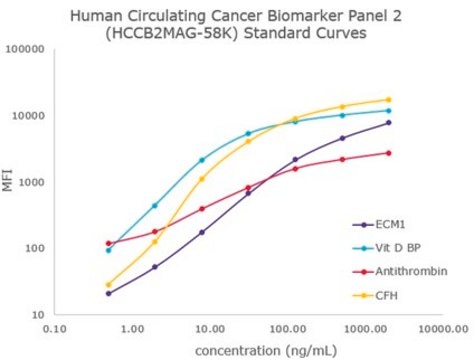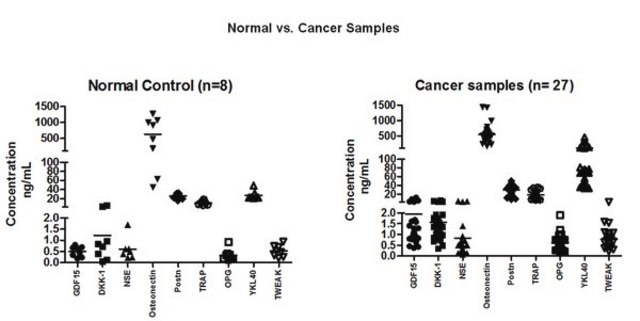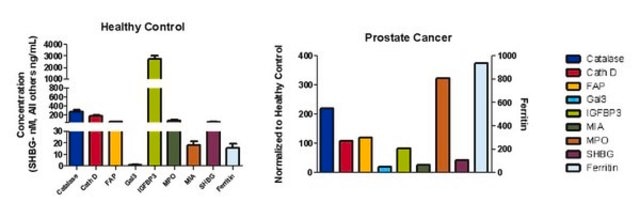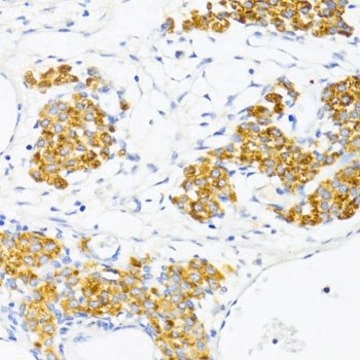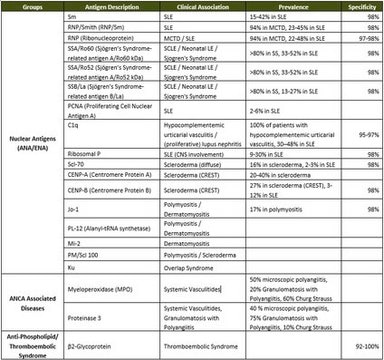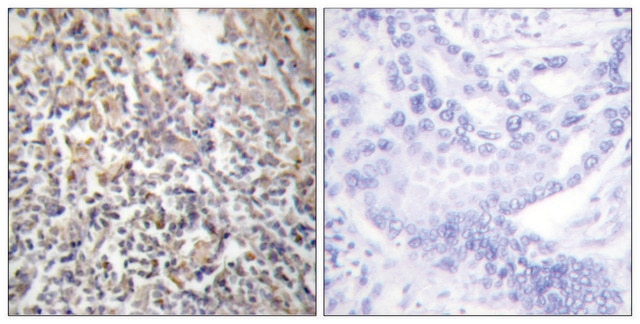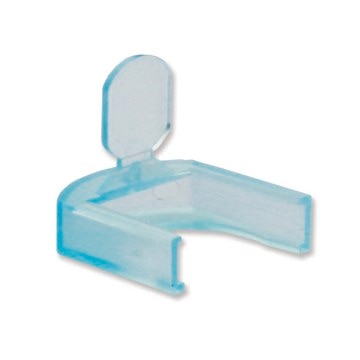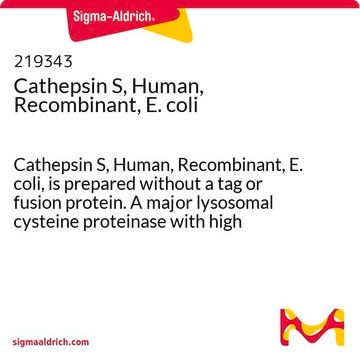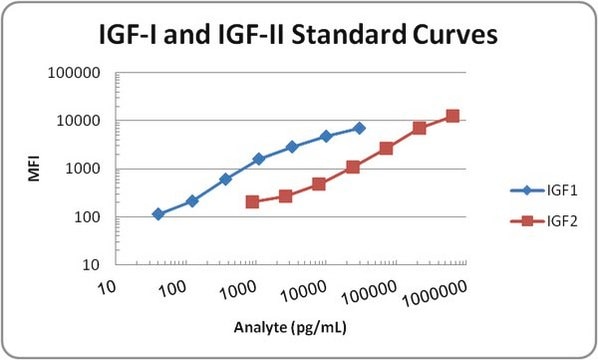HCABMAG-13K
MILLIPLEX® Human Cancer Autoantibody Magnetic Bead Panel - Cancer Multiplex Assay
Sign Into View Organizational & Contract Pricing
All Photos(1)
About This Item
UNSPSC Code:
12161503
NACRES:
NA.41
Recommended Products
species reactivity
human
manufacturer/tradename
Milliplex®
technique(s)
multiplexing: suitable
assay range
inter-assay cv: <20%
intra-assay cv: <10%
detection method
fluorometric (Luminex® xMAP®)
storage temp.
2-8°C
Related Categories
General description
Cancer autoantibodies have been studied as reporters of early carcinogenesis and indicators of cancer prognosis. Autoantibodies to tumor-associated antigens are putative cancer biomarkers, as these autoantibodies are abundant, detectable in early stages, and stable in serum. These autoantibodies may be developed from humoral immune responses to the changes in the expression levels of tumor-associated self-antigens, misfolded proteins, mutant antigens, and proteins involved in inflammation and the cellular death process. While the frequency of cancer autoantibody responses to an individual tumor antigen is typically low, the response to a multiplexed panel of antigens could be much higher. An optimized multiplex autoantibody panel to common tumor-associated antigens can improve the potential of using autoantibodies as biomarkers to study cancer development and progression, and it can serve as a simple and affordable tool in evaluating large numbers of patient samples for multiple cancer types.
The MILLIPLEX® MAP Human Cancer Autoantibody Magnetic Bead Panel is a 15-plex kit to be used for the simultaneous quantification of autoantibodies to any or all of the following analytes in serum and plasma samples: Alpha-enolase (ENO1), Cancer/Testis Antigen 1B (CTAG1B/NY-ESO-1), Cyclin-dependent kinase 4 inhibitor A (p16-INK4a), G2/mitotic-specific cyclin-B1 (CCNB1), Galactose-specific lectin-1 (Galectin 1), Galactose-specific lectin-3 (Galectin 3), Heat shock protein 60 (HSP60), Hypoxia-inducible factor 1-alpha (HIF1α), Insulin-like growth factor 2 mRNA-binding protein 2 (IMP-2), Insulin-like growth factor 2 mRNA-binding protein 3 (IMP-3), Mucin 1 (MUC1), Receptor tyrosine-protein kinase (HER2/ErbB2), sex determining region Y (SRY)-box 2 (SOX2), Survivin (Survivin/BIRC5), and Tumor protein p53 (p53). For this particular panel, four assay control beads are included as part of the base kit format.
The MILLIPLEX® MAP Human Cancer Autoantibody Magnetic Bead Panel is a 15-plex kit to be used for the simultaneous quantification of autoantibodies to any or all of the following analytes in serum and plasma samples: Alpha-enolase (ENO1), Cancer/Testis Antigen 1B (CTAG1B/NY-ESO-1), Cyclin-dependent kinase 4 inhibitor A (p16-INK4a), G2/mitotic-specific cyclin-B1 (CCNB1), Galactose-specific lectin-1 (Galectin 1), Galactose-specific lectin-3 (Galectin 3), Heat shock protein 60 (HSP60), Hypoxia-inducible factor 1-alpha (HIF1α), Insulin-like growth factor 2 mRNA-binding protein 2 (IMP-2), Insulin-like growth factor 2 mRNA-binding protein 3 (IMP-3), Mucin 1 (MUC1), Receptor tyrosine-protein kinase (HER2/ErbB2), sex determining region Y (SRY)-box 2 (SOX2), Survivin (Survivin/BIRC5), and Tumor protein p53 (p53). For this particular panel, four assay control beads are included as part of the base kit format.
Application
- Analytes Available: CCNB1/Cyclin B1, CTAG1B/NY-ESO-1, ENO1, Galectin-1 (GAL1), Galectin-3, ErbB2/HER2, HIF-1α, HSP60, IGF2BP2/IMP2, IGF2BP3/IMP3, Mucin-1 (MUC1), P16-INK4a, p53, Sox2, Survivin/BIRC5.
- Panel Type: MAGNETIC Circulating Cancer
- This is assay yields results in Median Fluorescence Intensity (MFI).
- Four assay control beads are included in the base kit.
- This is an overnight assay.
- Recommended dilution: This assay requires 25 μL of 1:100 diluted plasma or serum.
- Research Category: Oncology
- Research Sub-Category: Oncology, Tumor Markers, Immune Response
Features and Benefits
Design your multiplex kit by choosing available analytes within this panel.
Storage and Stability
Recommended storage for kit components is 2 - 8°C.
Legal Information
Luminex is a registered trademark of Luminex Corp
MILLIPLEX is a registered trademark of Merck KGaA, Darmstadt, Germany
xMAP is a registered trademark of Luminex Corp
Disclaimer
Unless otherwise stated in our catalog or other company documentation accompanying the product(s), our products are intended for research use only and are not to be used for any other purpose, which includes but is not limited to, unauthorized commercial uses, in vitro diagnostic uses, ex vivo or in vivo therapeutic uses or any type of consumption or application to humans or animals.
signalword
Warning
hcodes
Hazard Classifications
Aquatic Chronic 2 - Eye Irrit. 2 - Skin Sens. 1
wgk_germany
WGK 3
flash_point_f
Not applicable
flash_point_c
Not applicable
Certificates of Analysis (COA)
Search for Certificates of Analysis (COA) by entering the products Lot/Batch Number. Lot and Batch Numbers can be found on a product’s label following the words ‘Lot’ or ‘Batch’.
Already Own This Product?
Find documentation for the products that you have recently purchased in the Document Library.
Our team of scientists has experience in all areas of research including Life Science, Material Science, Chemical Synthesis, Chromatography, Analytical and many others.
Contact Technical Service